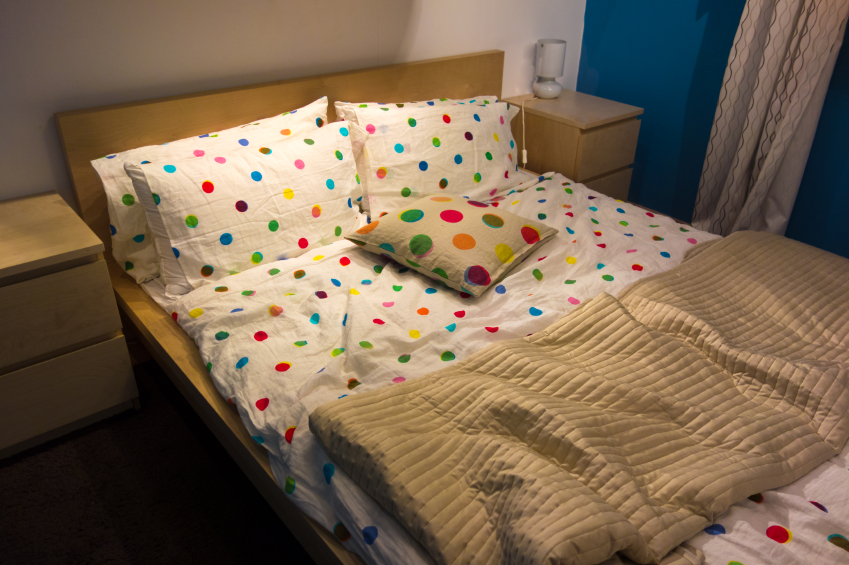The following post is written by Dr. Jacob Sagie.
If you’re one of the millions of parents with a bedwetting child, you know….
You know how awful it makes you feel when you see your child frustrated at another middle-of-the-night accident. You know how ashamed they are when younger siblings make jokes about still wearing diapers. You know how terrible they feel when they have to turn down another sleepover invitation because they are worried their friend will find out.
What you might NOT know is that much of the seemingly helpful advice you’re hearing could make the situation even worse.
Here are the top 7 mistakes parents make when dealing with a child who wets their bed:
1. Come on, let’s go to the bathroom
By far the most common mistake is waking your child in the middle of the night to take them to the bathroom. By waking up your child, the responsibility for staying dry is transferred from the child to the parents. There is no learning process, and children become accustomed to emptying their bladder during sleep. It is important for the child to take responsibility for staying dry and be the one to wake up by themselves.
2. Don’t drink so much
Fluid restriction before sleep time will only accustom the bladder to function at night with a small amount of liquid. The child needs to condition their body to wake up even for a small amount of fluid, so limiting their drinking will only make them go to sleep thirsty.
3. It’s your fault, you clean it up.
Many parents have good intentions, but they make the mistake of punishing or embarrassing a child thinking that it will lead to modified behavior. Parents need to know that the primary sufferer is the child, not the parent who is inconvenienced by having to change sheets and deal with extra loads of laundry. It is an unconscious activity and is not done on purpose. When a parent shows disappointment or punishes the child, it only aggravates the problem and makes the child feel even more distressed about the situation.
4. It’s a problem that I have to deal with, not you.
Instead of helping the child to cope with the problem, the parents wrap him or her with layers of protection. They feel guilty that their child is suffering from bedwetting and they don’t allow him to deal with the problem. The parents take responsibility, sometimes they deny the problem’s existence, or they are scared of offending their child. Often times, this is the case when a child is born with or has suffered from a medical condition or was conceived after years of fertility treatments and the parent feels the need to safe guard the child from any additional discomfort. Overprotection is not a solution because it is important that the child take responsibility for his actions and his own body.
5. Don’t worry, you’ll grow out of it.
Some parents completely ignore the problem’s existence hoping it will just go away. Many pediatricians tell the parents to just wait it out because there is nothing to do about it. (I completely disagree with this argument.) The problem with this technique is that they are ignoring the amount of distress or embarrassment this puts on the child. This could lead to extra months or even years of fear of having a slumber party with friends or not being able to go to sleep-away camp because they don’t want anyone to know they wet the bed. The child needs his parents’ support and understanding. When the parents ignore the problem, the child feels that he has no one to rely on.
6. Your little brother doesn’t wet the bed, why do you?
Sometimes, a younger sibling is already dry. Obviously an older child suffering from bedwetting feels embarrassed, jealous and even shameful about the situation. Don’t compare siblings. The parents assume that if the 5 years old younger brother has already outgrown bedwetting, it means that the 8 years old sibling is wetting the bed on purpose. The older child is accused of being lazy or apathetic. This attitude adds a great deal of pressure and will aggravate the problem.
7. I can’t bear changing the sheets every night. Just use a pull-up.
It is perfectly alright when pull-ups are being used by 4-5 year olds who haven’t been completely trained at night, but when they are being used nightly by older children, it is a big mistake. It suppresses any motivation to become dry; the message delivered by the parents is that they anticipate that the child will wet the bed and they do not expect him to get over the problem. It’s a band aid, instead of a solution. Instead of coping with bedwetting they perpetuate it. There is no learning process. The older a child gets, the less they want to feel like a ‘baby’ who needs to wear a diaper and can lead to low self-esteem and emotional problems.
About the Author:
Dr. Jacob Sagie is a world renowned expert in the field of bedwetting and has successfully treated over 30,000 patients in his clinics and through his online, at-home treatment kits available at www.bedwettingtherapy.com. His research into the field began 30 years ago this month as a parent struggling with a bedwetting child and not finding an available successful treatment model.





